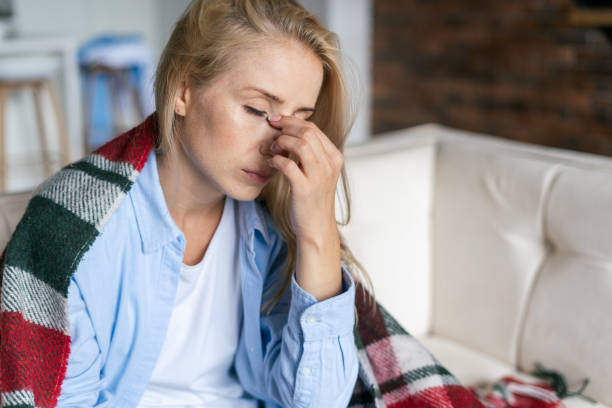As fall approaches, so does the season of colds, flu, and respiratory illnesses like COVID-19 and RSV. With more people falling ill and isolating to recover, it’s essential to recognize that both physical and mental health can take a toll during this time.
The isolation and challenges brought on by these illnesses can contribute to feelings of depression and anxiety. As professionals in mental health disorders, our staff from Options Residential will explore why illnesses like COVID-19 and the flu can lead to depression and anxiety. We’ll also provide practical steps to help improve mental well-being during illness and recovery.

Understanding the Impact of Illness on Mental Health
Why You Might Be Feeling Depressed After Covid
- Physical Symptoms: The physical symptoms of COVID-19, such as fever, fatigue, and respiratory distress, can be exhausting and uncomfortable. These symptoms can contribute to a sense of helplessness and frustration, which may lead to feelings of depression.
- Isolation: COVID-19 often requires isolation to prevent the spread of the virus. This isolation can lead to feelings of loneliness and disconnection from loved ones, exacerbating depressive symptoms.
- Uncertainty: The uncertainty surrounding COVID-19, including concerns about long-term health effects and the ever-changing nature of the pandemic, can create significant stress and anxiety, contributing to depression.
Why You’re Facing Depression After The Flu Or RSV
- Physical Strain: Similar to COVID-19, the flu or RSV can cause significant physical discomfort, including fever, body aches, and fatigue. These symptoms can make it challenging to maintain a positive outlook.
- Missed Activities: When individuals are too sick to participate in their usual daily activities, they may experience a sense of loss and disappointment, which can contribute to feelings of depression.
- Social Isolation: The flu is contagious, so individuals often isolate themselves to prevent spreading the virus to others. This isolation can lead to loneliness and social withdrawal, increasing the risk of depression.
Improving Mental Well-Being While Sick and in Recovery
- Stay Connected: Use technology to maintain social connections with friends and family during isolation. Video calls and phone chats can help combat feelings of loneliness.
- Practice Mindfulness: Engage in mindfulness exercises and deep breathing to manage stress and anxiety. These practices can help ground you in the present moment.
- Seek Support: Don’t hesitate to reach out to mental health professionals or support groups for guidance and reassurance during illness and recovery. When it is safe to visit again with family members and friends, it’s important to take physical health precautions to avoid a secondary infection or spread. Wash your hands, wear a mask, and create clean air conditions so you’re able to visit with them safely.
- Set Realistic Expectations: Understand that recovery takes time, and it’s okay to prioritize self-care and rest by staying at home. Pushing yourself can not only exacerbate symptoms but trigger symptoms of depression and anxiety.
- Stay Informed: Seek reliable information about your illness and recovery to alleviate uncertainty and anxiety.
- Focus on Nutrition: A balanced diet can aid in physical recovery and boost your mood.
- Engage in Light Activities: When possible, engage in gentle activities like reading, listening to music, or watching comforting movies to distract from discomfort.
- Gradual Reintegration: As you recover, gradually reintegrate into your usual activities, being mindful of your energy levels.
Remember that recovering from illness, whether it’s COVID-19, the flu, or any other ailment, is a process that can impact both your physical and mental well-being. By recognizing the challenges and taking proactive steps to support your mental health, you can navigate illness and recovery with greater resilience and well-being.
Explore Our 24-Hour Emergency Assistance Services:
At Options Residential, Inc., we are committed to providing 24-hour emergency assistance services that are tailored to meet the unique needs of individuals facing mental health challenges or those with a history of drug or alcohol abuse. Our person-centered approach places recovery and rehabilitation at the heart of our mission.
Comprehensive support under our emergency assistance services includes:
- Triage and Support for 911 Assistance: Our trained staff is ready to assist and provide guidance in critical situations.
- Problem Solving & Crisis Intervention: We offer expertise in addressing problems and managing crises effectively.
- Coping Skills and Crisis Planning: Identifying coping skills and triggers, and forming a crisis plan to navigate challenging moments.
- Coordination with Support Teams: We collaborate closely with support teams and other providers to ensure a holistic approach to care.
- Ongoing Assessment: Regular assessments are conducted to guarantee that individuals receive the appropriate level of support and that their journey toward recovery is on track.
Contact us today to learn more information about these services.

